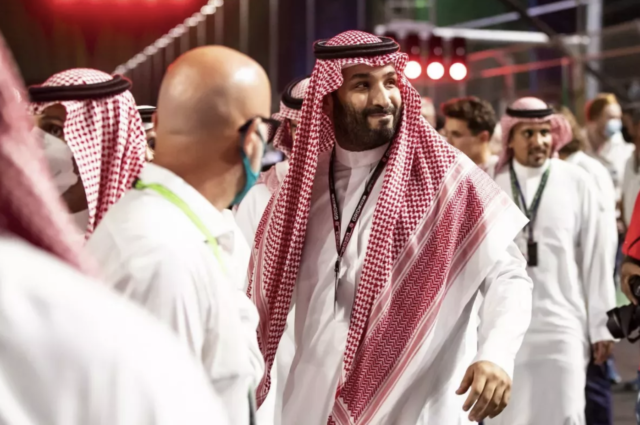U.S. National Security Advisor Jake Sullivan admits the Iran nuclear meetings are “not going well.” Now, Saudi Arabia is calling for a paradigm shift at the moribund talks, increasing the stakeholders in Vienna. The Saudis are doing so not a moment too soon.
Last week, almost unnoticed, the Gulf Cooperation Council (GCC), which includes Saudi Arabia, the United Arab Emirates (UAE), Bahrain, Kuwait, Oman and Qatar, put forward the usual agenda that stressed coordination on energy production and economic diversification. But in an unusual move, the group called on members to prohibit Hezbollah, Iran’s devastating occupying army in Lebanon, “from carrying out its terrorist activities and supporting terrorist militias that threaten the stability of Arab countries.” The GCC also expressly called out Iran.
Saudi Crown Prince Mohammed bin Salman (MbS) was out in front. Before the meeting, he toured the region, including a stop in Qatar—which endured a GCC blockade in 2017 for its relations with Iran and its support of various terror organizations, including Hamas and the Taliban. But attacks by Iran-supported and Yemen-based Houthis on Saudi oil facilities in 2019 prompted Qatari leaders to reaffirm the principle of GCC collective security, paving the way for sanctions to be lifted by the GCC in January 2021.
At the summit in Riyadh, MbS called for an “effective and serious approach” to the negotiations on Iran’s nuclear and ballistic missile programs. What would that approach be? In an interview, Saudi Foreign Minister Prince Faisal bin Farhan said the Vienna negotiation “is worrying and does not create optimism,” and that the Saudis should have a presence at the talks. “Iran maintains an intransigent position… and that is certainly worrying,” he said, adding that a Saudi presence at the table “would allow us to be close to solutions since we are one of the countries most threatened.”
In other words, a paradigm shift. And a wise one.
The last round of talks in Vienna adjourned in a flood of competing tweets, which, apparently, can substitute for diplomacy these days. Russian negotiator Mikhail Ulyanov tweeted that “numerous outstanding issues still remain. But the negotiators work hard to narrow down the differences.” How vague and unhelpful.
The E-3 (U.K., France and Germany) posted, “Time is running out. Without swift progress, in light of Iran’s fast-forwarding of its nuclear program, the [2015 Iran nuclear deal] will soon become an empty shell.” How similarly vague and unhelpful.
Iran’s negotiator, Ali Bagheri Kani, posted in a tweet that some counterparts still “persist in their blame game habit, instead of real diplomacy.”
Kani is right; the question is how to get beyond blame.
The genius of the 2020 Abraham Accords peace was that of a changed perspective. As long as the order of diplomacy in the region was Palestinians first, which was the American order since the 1990s-era Oslo Accords, Israel’s relations with Jordan and Egypt were cold despite treaties, and others in the region were discouraged from approaching Israel on any terms. Rancid and radical, Palestinian leadership nonetheless held the key to better—or worse—relations among states. The paradigm was wiped out by events on the ground. The “Arab Spring” was a disaster for the Arab states, ISIS was a threat and Iran had wrecked countries around the region and threatened the Sunni Gulf states.
The Abraham Accords took the Palestinians out of the center and permitted individual countries in the region to make decisions about their needs and those of their people. To the extent those needs included stable governments, economic advancement and security from regional threats, Israel could be a natural partner for those who chose it. And a number did choose it. The Accords are an astonishing political, economic and security success in the Gulf and across northern Africa.
In Vienna, everyone is doing everything but actual diplomacy. That is reason enough to take up MbS on the thought that those who are most likely to be impacted by an Iranian nuclear capability, and who already have been impacted by Iranian missile technology, should be at the negotiating table. Why does France have standing in Vienna, but Saudi Arabia does not? Why is Germany (which only reduced its economic relations with Iran under President Trump’s “maximum pressure” sanctions regime) there, but the UAE not? Why is Israel, the explicitly announced object of genocidal Iranian threats, not represented?
While it is unlikely Iran will agree to have a GCC delegation directly participate, it would be sensible for the West to insist that those countries be in the room.
Changing the players and changing the focus did wonders for the Abraham Accords partners. A paradigm shift in Vienna would, at minimum, allow natural regional issues to come to the fore, reminding Iran that, in the end, it lives in its neighborhood and its neighbors count.






